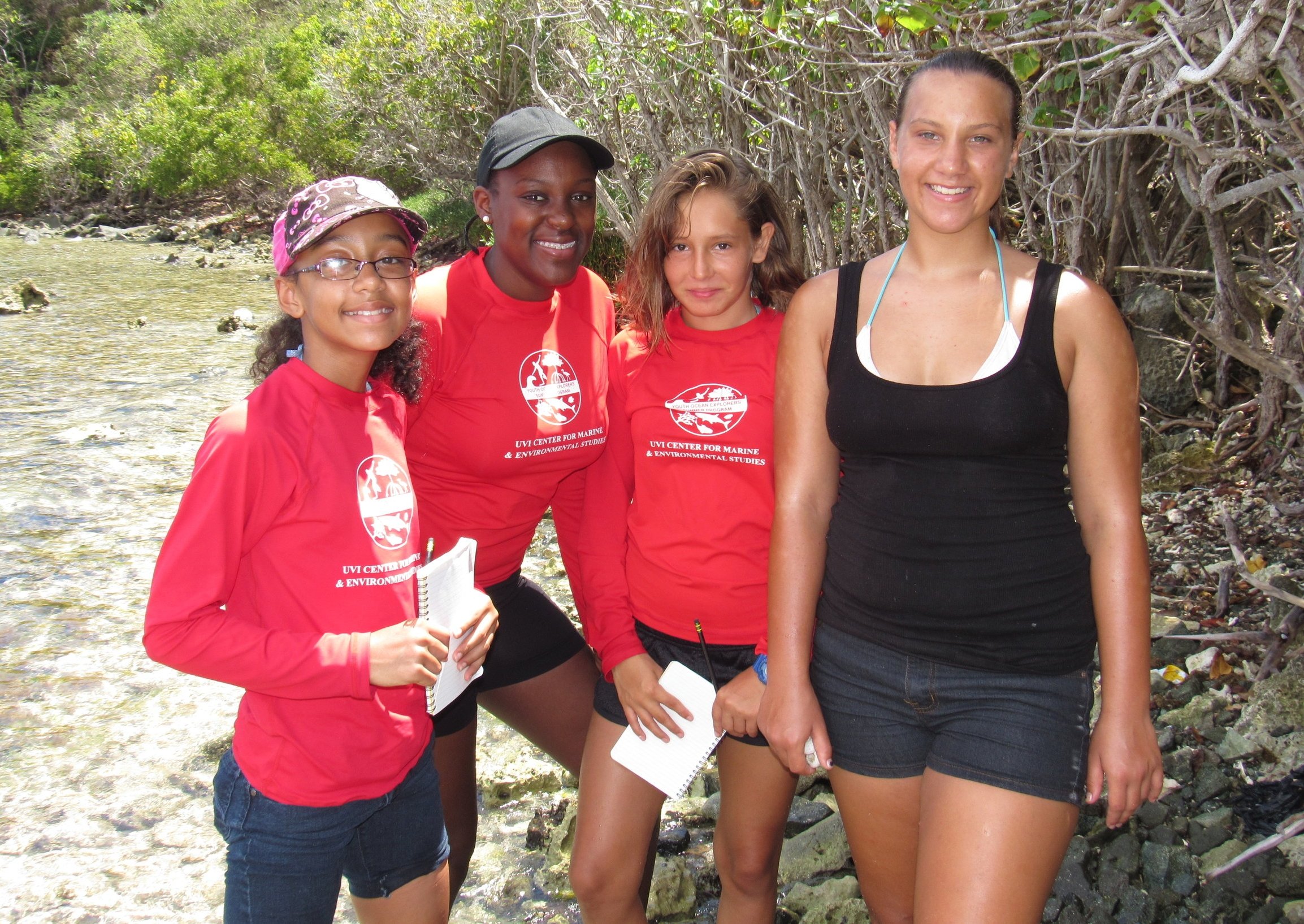Don’t Let Fear Stop You: Inspiration From A Female African American Scientist
Zola (second from left) in 2016 with Youth Ocean Explorer students explore the shoreline around UVI’s Center for Marine & Environmental Studies. Photo: Jarvon Stout.
A mentorship with the Youth Ocean Explorers (YOE) program at the University of the Virgin Islands in 2016 gave Zola Roper, a then undergraduate student at the University of the Virgin Islands, the opportunity to work directly with island youth in the four-week marine science summer camp. Together with the other mentors and camp leaders, Zola introduced YOE participants to marine animals, ecological concepts, data collection and so much more. Often, her task at hand was to help one child overcome a fear of the water, while encouraging another to touch what at first sight appeared to be a terrifying creature (in reality, the humble arrow crab, sea cucumber or octopus). “Don’t let fear stop you” Zola says, “fear of the unknown should never stop you.”
From an early age, Zola was raised by her powerhouse grandmother, a retired public-school educator. Zola’s grandmother was instrumental in her decision to pursue a Masters of Marine & Environmental Studies degree at the University of the Virgin Islands. Now in her second year of study, Zola’s thesis focuses on marine debris in the U.S. Virgin Islands, a pervasive and important local environmental issue.
Marine debris is any solid, man-made, persistent materials which enter the ocean from land or sea. Zola is analyzing data collected through the Ocean Conservancy’s International Coastal Cleanup activities on USVI beaches over the past 30 years to answer questions about USVI marine debris abundance, distribution, sources and transport. The hope is that her findings can highlight solutions to this territory-wide problem, and potentially, influence decisions made by policy-makers.
So much in Zola’s life has prepared her for the MMES program, including both her Charlotte Amalie High School science teachers, Mrs. Nneka Howard-Sibilly and Mr. Vernon Callwood. Mr. Callwood, a collaborating Virgin Islands Institute for STEM Education Research and Practice (VI-ISERP) educator and one of the teachers involved in the Marine Debris Program at UVI remembers Zola fondly as a top student, motivated and determined to succeed at a career in science.
Onboard the NOAA research vessel Nancy Foster, Zola is seen here with Dr. Sennai Habtes, Research Assistant Professor of Biological Oceanography at UVI (at left). Photo: Vanessa McKague
Zola spent her time onboard the Nancy Foster assisting with sample collection and data analysis. Photo: Vanessa McKague
This past summer Zola had the opportunity to participate in a research cruise onboard the National Oceanic and Atmospheric Administration (NOAA) research vessel Nancy Foster. The Nancy Foster, which conducts research operations in Territorial waters annually, often works with members of the Center for Marine & Environmental Studies at UVI, and selected graduate students are invited to participate. This particular expedition, at sea from June 5th-23rd, focused on collecting data on larval fish surrounding the Territory. Zola assisted with sampling and data analysis while onboard.
“It was a great opportunity being able to participate in such interesting research being conducted around our very own territory and the neighboring British Virgin Islands.” says Zola. “I definitely gained a new skill set by engaging on the cruise and had the opportunity to interact with members of NOAA and other individuals within the scientific community such as PhD scientists and other students.”
Zola is deeply invested in the Virgin Islands and is considering how she can impact environmental education in the Territory. She hopes to earn her Masters of Marine and Environmental Studies degree in 2019.



